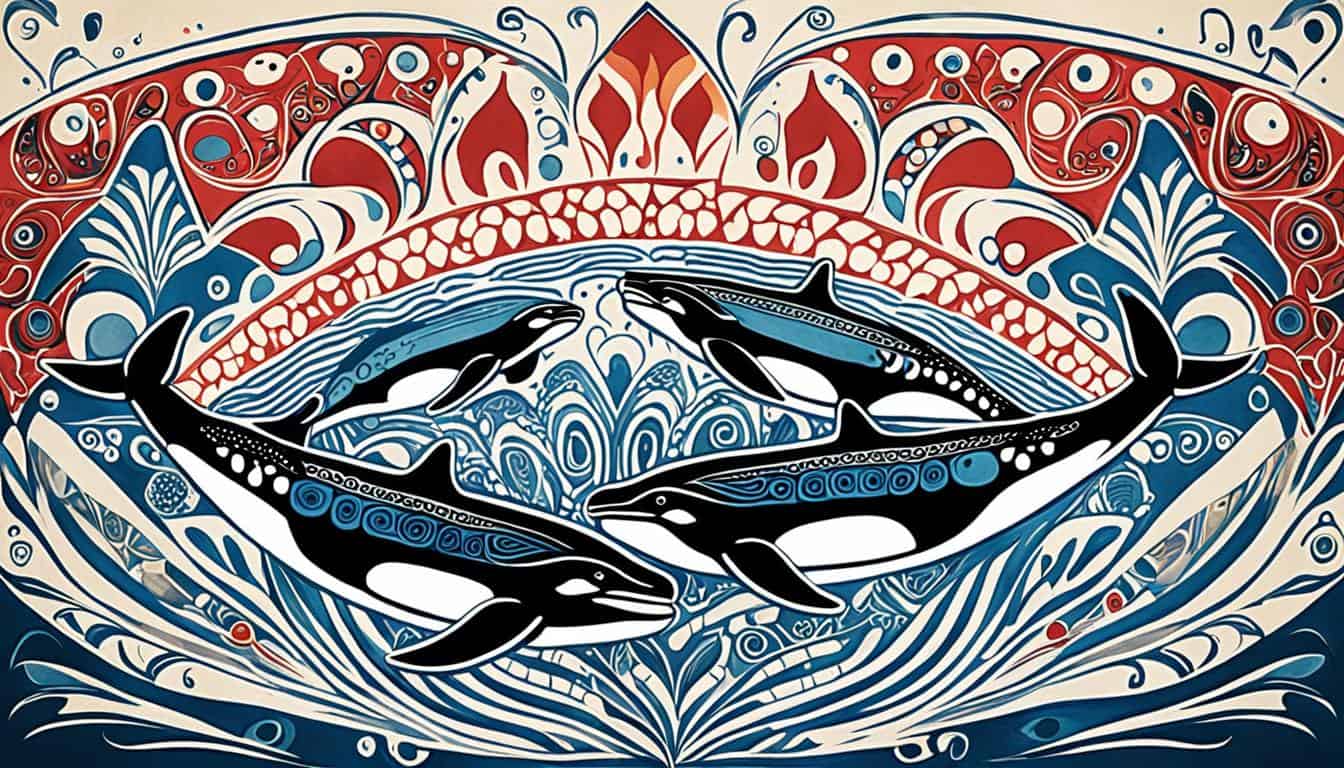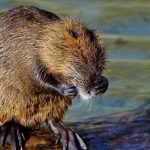Orcas, also known as killer whales, hold a special place in many cultures. This is especially true in the Pacific Northwest for Indigenous communities. They symbolize family, compassion, and luck. These creatures are more than just animals; they are part of deep stories and beliefs passed down through generations.
The orca symbolism is fascinating because of their social structure. Older females lead the pods, teaching the young important skills and traditions. This shows how orcas are seen as protectors of the sea by Indigenous cultures. It’s important to understand and support the conservation of these amazing creatures and their connection to Indigenous cultures.
Cultural Importance of Orcas Across Indigenous Communities
Indigenous communities have a deep bond with orcas. They see these creatures as more than just powerful marine animals. They are symbols of community, harmony, and protection.
Orcas are seen as guardians. They guide travelers safely across the sea. This shows how important family and social bonds are to them.
Orcas play a big role in many traditions. They are seen as ancestral spirits in stories and art. This connects the physical and spiritual worlds.
Art like carvings and masks often feature orcas. They show how important these creatures are in their culture.
Learning about orcas in Indigenous culture shows us their deep meaning. It shows how they balance nature and humanity. This connection is strong in their communities, keeping their traditions alive.
What is the cultural significance of orcas?
Orcas are highly respected in many cultures. They show a deep link to the sea and our lives. Their stories have been shared for many years, showing their spiritual value and role in community.
Orcas as Guardians of the Sea
In coastal Indigenous cultures, orcas are seen as guardians of the sea. They are symbols of strength and protection. These creatures guide and watch over those who explore the ocean.
Their stories in orca mythology show their power in the sea. They are seen as protectors of nature. These stories tell of orcas as spirits that care for and rule the water.
Symbolism of Family and Companionship
Orcas are known for their strong family bonds. They live in close groups, showing how they work together and care for each other. This shows the importance of family in their lives.
Their family life mirrors human values like unity and love. They share food and take care of their young, showing a deep connection. This connection goes beyond just family, teaching us about community and protecting our families.
As we work to save orcas, we must remember their role in their communities. This is key to their survival.
Orca Symbolism in Various Cultures
Orcas mean a lot to different cultures, especially in Native American beliefs. They symbolize strength, family, and deep connections with nature. Learning about orca symbolism helps us see how different societies view their world and their relationships.
Orca Symbol in Native American Beliefs
Many Native American tribes see orcas as special beings. They think that when someone drowns, their spirit turns into an orca. This orca protects the ocean’s depths. It shows how life is connected and how orcas are important in culture.
Stories about orcas show respect for nature. They see orcas as guardians and symbols of community continuity.
Comparative Symbolism Across Cultures
Orcas are important in many cultures around the world, not just Native American ones. They are seen as symbols of loyalty and power. Often, they are seen as leaders in their societies.
This is reflected in traditional art. Art about orcas shows their importance and the respect people have for them.
| Culture | Orca Symbolism | Associated Beliefs |
|---|---|---|
| Native American | Transformation and guardianship | Spirit protection and community connection |
| Maori (New Zealand) | Connection to ancestors | Guidance and strength in adversity |
| Japanese | Harmony with nature | Balance and social structure |
| Inuit | Resourcefulness | Survival and sustenance |

The Role of Orcas in Mythology and Folklore
Orcas have a deep place in the myths of Indigenous cultures. They are often at the center of stories that teach important lessons. These stories highlight the value of family and the power of orcas as spirits.
The Haida people see orcas as powerful beings that can change shape and talk to humans. This shows how important orcas are in their myths. It shows how these creatures are linked to the spiritual stories of their communities.
Orcas are more than just animals in these stories. They stand for balance and harmony in nature. They act as protectors, showing us the importance of taking care of the environment.
These stories teach us to respect all living things and our duty to protect the earth. By looking into these tales, we see how orcas connect people with nature. They help us understand the deep bond between us and the world around us.
These stories talk a lot about taking care of the planet. They remind us of the need for sustainable living today. By learning about orca myths and folklore, we learn valuable lessons that apply everywhere.
Orcas are seen as protectors and symbols of our duty to the environment. They play a big role in many cultures. They help shape community values and teach us to respect nature.
FAQ
What is the cultural significance of orcas in Indigenous communities?
Orcas are very important in Indigenous cultures, especially in the Pacific Northwest. They stand for family, kindness, and good luck. They tell stories that show they protect the sea and represent strong family ties.
How are orcas represented in Indigenous art?
Orcas appear in Indigenous art like carvings, masks, and modern art. These pieces show their deep cultural value. They highlight the importance of family and community through art.
What do orcas symbolize in Native American beliefs?
In Native American beliefs, orcas mean family, community, and life’s connection. They are seen as magical beings that protect the ocean and help lost souls. This shows the deep values of these communities.
How do orcas convey the importance of family and companionship?
Orcas live in close groups and show strong care for their young. They share food with family, showing the strength of family bonds. This makes them symbols of unity and love in many stories.
What role do orcas play in mythology and folklore?
Orcas are big in mythology and folklore in many Indigenous cultures. They teach moral lessons and show family ties. They are seen as powerful spirits that keep nature in balance, showing the need to protect the environment.
How does the culture of orcas affect their behavior and social structures?
Research shows orca culture influences their actions, how they talk to each other, and what they eat. They live in groups led by older females. These females teach them important survival skills and traditions, showing the value of their social groups.
Source Links
- https://www.smithsonianmag.com/science-nature/understanding-orca-culture-12494696/
- https://spiritsofthewestcoast.com/collections/the-orca-symbol-or-killer-whale?srsltid=AfmBOopdr57oeOLBp9PD54x98jafQxITpzvbomc7tbVi4yFYd1lZ_P_1
- https://georgiastrait.org/work/species-at-risk/orca-protection/killer-whales-pacific-northwest/







